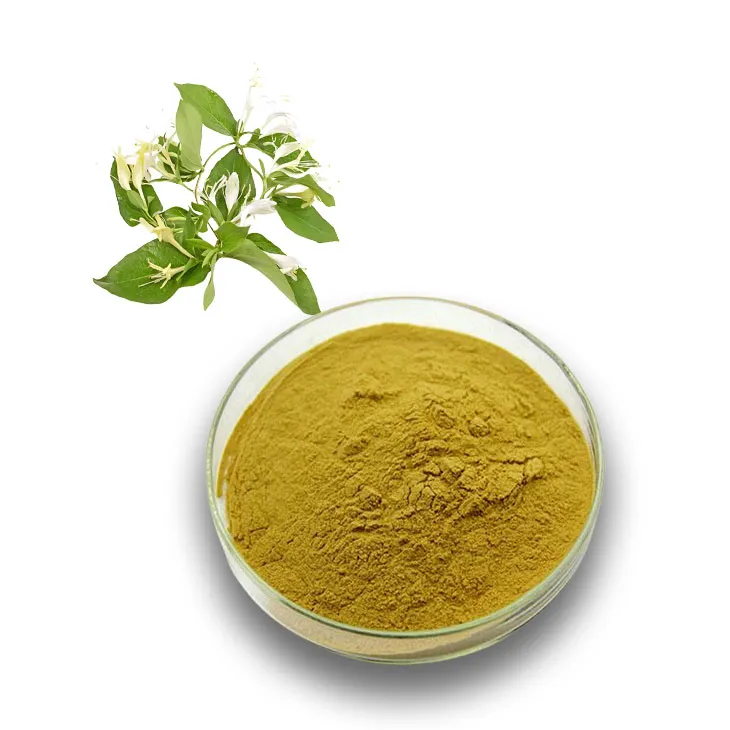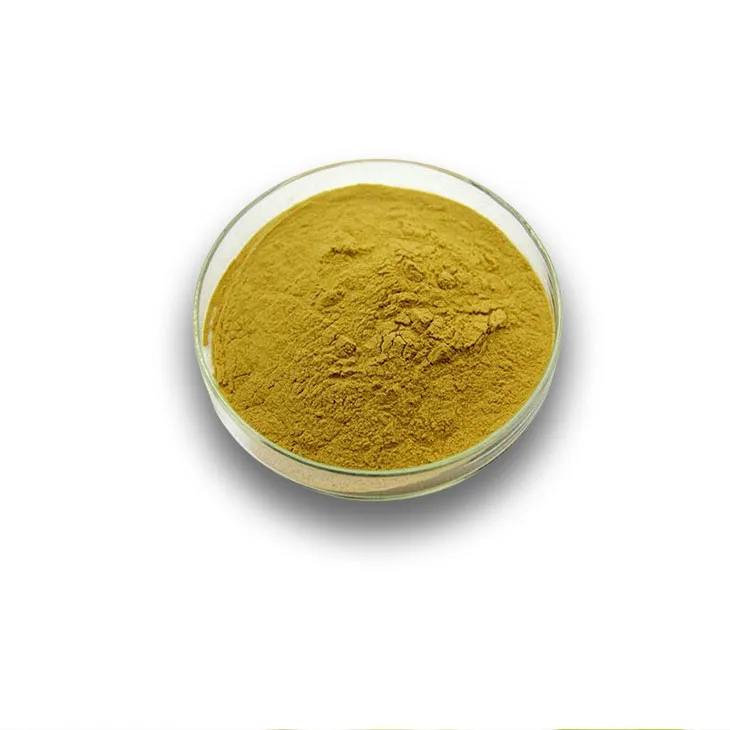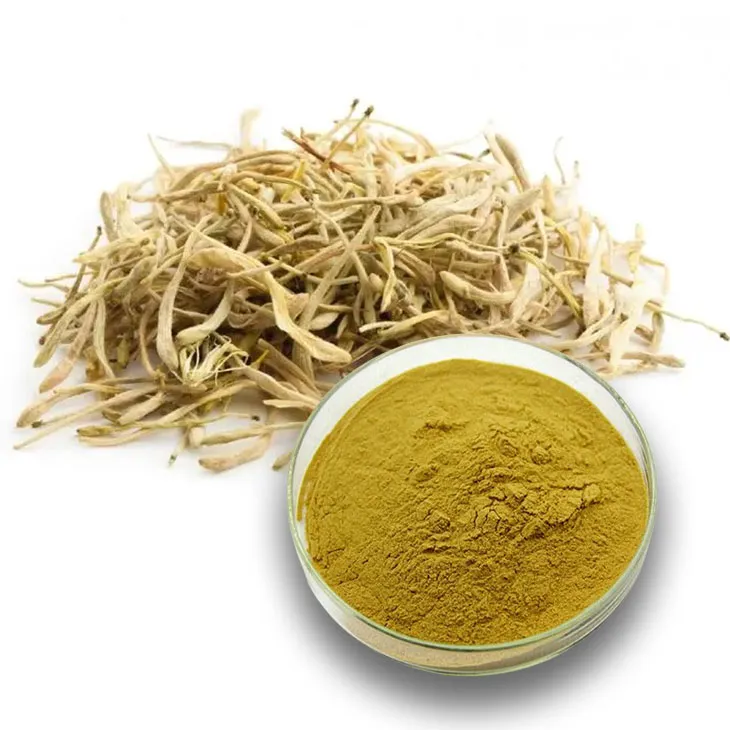- 0086-571-85302990
- sales@greenskybio.com
Six Amazing Benefits of Honeysuckle Pollen for Creating Perfect Skin!
2024-11-12

1. Rich in Nutrients
Honeysuckle Pollen is a natural treasure trove of nutrients. It contains a significant amount of proteins, which are the building blocks of our skin cells. These proteins help in the repair and regeneration of skin tissues, ensuring that the skin remains healthy and supple.
It also has vitamins, such as vitamin C, which is well - known for its antioxidant properties. Vitamin C helps to protect the skin from free - radical damage caused by environmental factors like pollution and UV rays. This, in turn, reduces the appearance of wrinkles and fine lines, giving the skin a more youthful look.
Another important nutrient present in Honeysuckle Pollen is minerals like zinc. Zinc plays a crucial role in maintaining the skin's oil - producing glands in balance. It helps to control sebum production, preventing the skin from becoming too oily or too dry. This is essential for achieving a clear and healthy complexion.

2. Antioxidant Power
The antioxidants in Honeysuckle Pollen are one of its most remarkable features. Flavonoids are a type of antioxidant found in it. These flavonoids work to neutralize free radicals in the body. Free radicals are unstable molecules that can damage cells, including skin cells. By neutralizing them, honeysuckle pollen helps to prevent premature aging of the skin.
Antioxidants also play a role in reducing inflammation in the skin. Inflammation can lead to various skin problems such as acne, eczema, and psoriasis. By reducing inflammation, honeysuckle pollen can soothe irritated skin and promote a more even - toned complexion.
Moreover, the antioxidant activity of honeysuckle pollen can enhance the skin's natural defense mechanism. It strengthens the skin's barrier function, making it more resistant to external aggressors like bacteria, viruses, and allergens.

3. Hydration and Moisturization
Honeysuckle pollen has the ability to deeply hydrate the skin. It contains substances that can attract and retain moisture. This is important because well - hydrated skin looks plump, smooth, and radiant.
When applied topically, honeysuckle pollen forms a thin, protective layer on the skin that seals in moisture. This layer also helps to prevent water loss from the skin, keeping it hydrated for a longer period of time.
For those with dry skin, using products containing honeysuckle pollen can be a great solution. It can help to relieve the tightness and flakiness associated with dry skin, leaving it feeling soft and supple.

4. Skin Brightening
One of the significant benefits of honeysuckle pollen for the skin is its skin - brightening effect. It contains certain compounds that can inhibit the production of melanin.
Melanin is the pigment responsible for skin color. Excessive melanin production can lead to dark spots, hyperpigmentation, and an uneven skin tone. By inhibiting melanin production, honeysuckle pollen can help to lighten dark spots and even out the skin tone, giving the skin a more luminous appearance.
Regular use of honeysuckle pollen - based products can also enhance the overall radiance of the skin. It can make the skin look fresh, healthy, and glowing, as if it has been lit from within.

5. Anti - Acne Properties
Honeysuckle pollen has anti - acne properties that can be beneficial for those with acne - prone skin. Its antibacterial properties can help to fight against the bacteria that cause acne, such as Propionibacterium acnes.
It also helps to regulate sebum production, as mentioned earlier. Excess sebum can clog pores, leading to the formation of acne. By keeping sebum production in check, honeysuckle pollen can reduce the likelihood of acne breakouts.
Furthermore, the anti - inflammatory nature of honeysuckle pollen can soothe the redness and inflammation associated with acne. This can help to speed up the healing process of acne lesions and prevent the formation of acne scars.
6. Soothing and Calming
The skin - soothing and calming properties of honeysuckle pollen make it suitable for sensitive skin types. It can relieve skin irritation, itching, and redness.
Whether the skin irritation is caused by environmental factors, such as exposure to harsh chemicals or extreme weather conditions, or by internal factors like stress, honeysuckle pollen can provide relief.
It can also help to strengthen the skin's tolerance. Over time, regular use of honeysuckle pollen - based products can make the skin less reactive and more resilient to various stimuli.
How to Incorporate Honeysuckle Pollen into Your Skincare Routine
1. Honeysuckle Pollen Face Masks
You can create your own honeysuckle pollen face mask at home. Mix a small amount of honeysuckle pollen with a suitable base such as yogurt or honey. Apply the mixture to your face and leave it on for 15 - 20 minutes before rinsing off with warm water. This will help to nourish and rejuvenate your skin.
2. Honeysuckle Pollen - Infused Serums
Look for skincare products that contain honeysuckle pollen - infused serums. These serums are often lightweight and can be easily absorbed by the skin. Apply a few drops of the serum to your face after cleansing and toning, and follow with your regular moisturizer.
3. Honeysuckle Pollen Supplements
In addition to topical application, you can also consider taking honeysuckle pollen supplements. However, it is important to consult a healthcare professional before starting any new supplement regimen, as they can interact with other medications or have potential side effects.
Precautions
While honeysuckle pollen has many benefits for the skin, it is important to note some precautions. Allergic reactions can occur in some individuals. Before using any honeysuckle pollen - based products, it is advisable to do a patch test on a small area of skin, such as the inner forearm. Wait for 24 - 48 hours to see if there is any redness, itching, or swelling.
Also, make sure to purchase honeysuckle pollen products from reliable sources. Poor - quality products may not contain the pure and effective ingredients as claimed, or may be contaminated with other substances.
Conclusion
Honeysuckle pollen offers a plethora of benefits for creating perfect skin. From its rich nutrient content to its antioxidant, hydrating, skin - brightening, anti - acne, and soothing properties, it can be a valuable addition to your skincare routine. By incorporating honeysuckle pollen - based products or supplements into your daily regimen, you can take a step towards achieving healthy, beautiful, and radiant skin.
FAQ:
What are the main nutrients in honeysuckle pollen?
Honeysuckle pollen contains a variety of nutrients such as proteins, amino acids, vitamins (like vitamin C, vitamin E), and minerals (such as zinc, selenium). These nutrients play important roles in maintaining skin health, for example, proteins and amino acids are the building blocks for skin cells, while vitamins and minerals can act as antioxidants and help in various metabolic processes related to the skin.
How does honeysuckle pollen deeply nourish the skin?
The nutrients in honeysuckle pollen can penetrate the skin layers. The amino acids can repair damaged skin cells, and the vitamins and minerals help in maintaining the skin's moisture balance. For instance, vitamin E can improve the skin's lipid barrier, preventing moisture loss and allowing the skin to be well - hydrated and nourished from within.
Can honeysuckle pollen improve dry skin?
Yes, it can. As mentioned before, honeysuckle pollen contains elements that help in maintaining the skin's moisture balance. It also has substances that can stimulate the skin's natural oil production in a balanced way. This helps in alleviating dryness, making the skin softer and more supple.
Is honeysuckle pollen suitable for all skin types?
Generally, honeysuckle pollen is suitable for most skin types. However, those with extremely sensitive skin may need to do a patch test first. For normal, dry, and oily skin types, it can bring benefits such as nourishment, improvement of texture, and antioxidant protection. But in case of any irritation during use, it is advisable to stop using it immediately.
How long does it take to see the effects of honeysuckle pollen on the skin?
The time to see the effects can vary from person to person. Some people may notice a difference in skin texture, such as increased smoothness, within a few weeks of regular use. However, for more significant improvements like reduction in fine lines or improvement in overall skin tone, it may take several months of continuous use, depending on factors like individual skin condition, diet, and lifestyle.
Related literature
- The Nutritional Components of Honeysuckle Pollen and Their Effects on Skin Health"
- "Honeysuckle Pollen: A Natural Source for Skin Nourishment"
- "Beneficial Substances in Honeysuckle Pollen and Their Impact on Skin Quality"
- ▶ Hesperidin
- ▶ Citrus Bioflavonoids
- ▶ Plant Extract
- ▶ lycopene
- ▶ Diosmin
- ▶ Grape seed extract
- ▶ Sea buckthorn Juice Powder
- ▶ Fruit Juice Powder
- ▶ Hops Extract
- ▶ Artichoke Extract
- ▶ Mushroom extract
- ▶ Astaxanthin
- ▶ Green Tea Extract
- ▶ Curcumin
- ▶ Horse Chestnut Extract
- ▶ Other Product
- ▶ Boswellia Serrata Extract
- ▶ Resveratrol
- ▶ Marigold Extract
- ▶ Grape Leaf Extract
- ▶ New Product
- ▶ Aminolevulinic acid
- ▶ Cranberry Extract
- ▶ Red Yeast Rice
- ▶ Red Wine Extract
-
Passionflower Extract
2024-11-12
-
Lemon Extract
2024-11-12
-
Quercetin
2024-11-12
-
Baicalin
2024-11-12
-
Feverfew Extract
2024-11-12
-
Rosemary extract
2024-11-12
-
Aguaje Extract
2024-11-12
-
Fig Extract
2024-11-12
-
Eyebright Extract
2024-11-12
-
Saw Palmetto Extract
2024-11-12





















